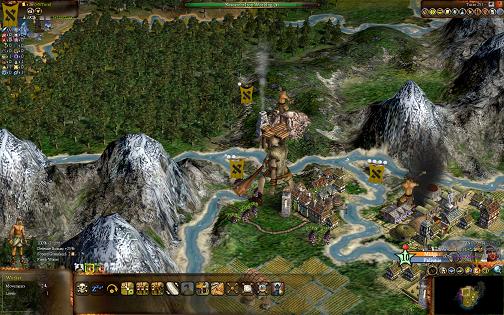
My copy of Grand Theft Auto IV still hasn’t arrived yet but I’m not unhappy because I’m fully occupied with Fall from Heaven 2 at the moment. This may have started life as a mere “mod” for Civilization 4, but it’s so complete and fully featured that I wouldn’t hesitate to call it a full game in its own right. Builds of it has been circulating since 2006 but the development team only announced it as being feature complete in December 2008 so I’m not feeling too guilty about waiting until now to invest time into it. Hey, if I’m going to put dozens of hours into it, I want the finished and polished package!
For players already used to Civilization 4, a simple glance at the screen reveals how much work has gone into this project: new models and artwork for the different units and buildings of the 21 factions, new terrain types and effects with associated art and sound assets, a revamped UI to incorporate the additional gameplay elements and even a detailed card mini-game within the game! By far the greatest accomplishment however is that while a faction in Civilization 4 is differentiated from its peers only by its leader traits and a unique unit and building, all of the factions in Fall from Heaven 2 are so different that it’s like playing a new game with each of them.
Not only do each of the factions have numerous unique units and buildings, they also incorporate unique gameplay mechanics. The Grigori faction for example, can produce Adventurers as Great Persons, effectively powerful heroes that can be customized according to your needs. The Calabim faction stands out by being the only one able to field vampires, and, yes, these really are as powerful as one would imagine them to be and can feed on your cities’ excess population. In addition to all that, the choice of religion also opens up new units, buildings, spells and civics.
All of this makes for a combination of rich and interesting choices that I’ve never seen since Alpha Centauri. Plenty of people have already named Civilization 4 as one of the greatest strategy games of all time, but I can confidently say that Fall from Heaven 2 improves upon it in every conceivable way. Watch this blog for updates as I explore the myriad possibilities of this amazing game.



